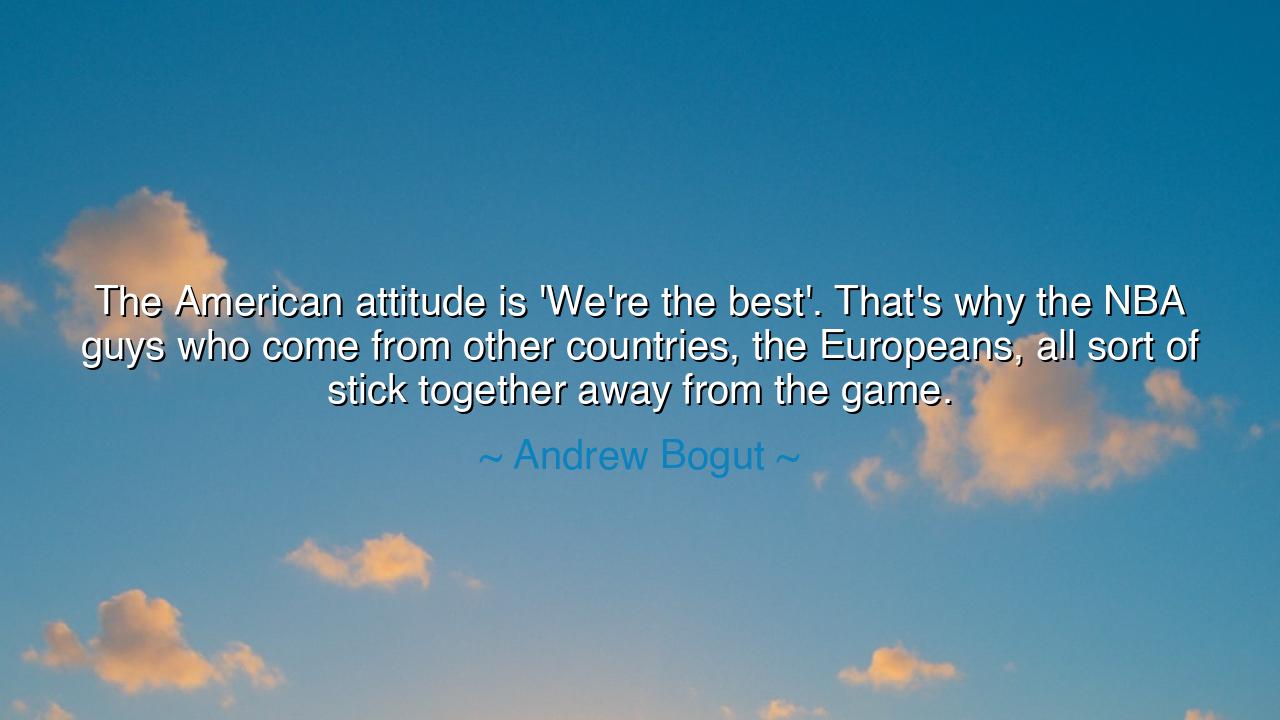
The American attitude is 'We're the best'. That's why the NBA
The American attitude is 'We're the best'. That's why the NBA guys who come from other countries, the Europeans, all sort of stick together away from the game.






Host: The rain outside had settled into a quiet drizzle, soft but steady. Inside the café, the dim light from the overhead lamps bathed the room in a warm glow, and the soft murmur of the other patrons created an almost intimate atmosphere. Jack and Jeeny sat across from each other, their mugs of coffee between them, the weight of the conversation hanging in the air. Jack was the first to break the stillness, his voice thoughtful, but with a touch of curiosity.
Jack: “I read something today from Andrew Bogut. He said, ‘The American attitude is ‘We’re the best.’ That’s why the NBA guys who come from other countries, the Europeans, all sort of stick together away from the game.’ What do you think about that?”
Jeeny: Her fingers gently wrapped around her cup, her gaze never leaving Jack. “It’s interesting, isn’t it? I think it speaks to how deeply ingrained this idea of American exceptionalism is, not just in sports, but in culture. The idea that America is the best, and that anyone who comes from outside needs to prove themselves in this very specific way. For the international players, there’s something about the American attitude that feels isolating.”
Jack: He raised an eyebrow, his usual skepticism creeping in. “But isn’t that just part of what makes America, America? The confidence, the pride in being the best? It’s what drives people to excel. Sure, it might feel alienating to those who aren’t from here, but I think it’s what fuels the competition, especially in a sport like basketball.”
Host: The rain, now a faint patter, seemed to mirror the shift in their conversation, as Jeeny leaned forward slightly, her voice calm but carrying an underlying depth, a quiet resistance to the idea of unquestioned superiority.
Jeeny: “I agree that confidence is important, and pride in what you do is necessary, especially in competition. But when that confidence turns into an attitude of ‘We’re the best and everyone else is secondary,’ it creates a barrier. The international players in the NBA, they’re some of the best, but they’re also outsiders. They may be viewed as ‘foreign’ or different, even if they’re just as talented. They stick together because they need a sense of community, a place where they’re not judged by where they’re from.”
Jack: “But isn’t that natural? People always tend to gravitate toward others who understand their experiences, their background. It’s not just about feeling isolated because of the American attitude—it’s about finding a shared experience among those who understand the cultural challenges. It’s not just an NBA thing—it happens everywhere.”
Host: The whispering of the rain had almost stopped, leaving a quiet in the café that felt like a pause before the next thought. Jeeny’s gaze softened, her expression thoughtful but unwavering.
Jeeny: “True, but the fact that these players need to group together highlights something deeper—an unconscious barrier that’s created by this belief that America is the center of everything. It’s about more than just comfort; it’s about being seen and respected. When the attitude is ‘We’re the best,’ it leaves no room for equality, for diversity in how we define excellence. It’s almost as if the greatness of others is overlooked because it doesn’t fit within that American framework of success.”
Jack: “You’re saying that the American belief in being the best—this sense of superiority—can alienate others, even when they’re just as great? That’s a pretty big pill to swallow, Jeeny. How can you maintain pride in your own culture and still leave room for others to succeed without feeling threatened?”
Jeeny: “I think it’s about balance. You can take pride in your culture, your achievements, without diminishing someone else’s. True greatness isn’t about standing above everyone else; it’s about lifting each other up. When the American attitude says, ‘We’re the best, and no one else matters,’ it shuts out the possibility of shared greatness. The NBA players from Europe don’t need to prove themselves, they need to be accepted as equals.”
Host: The café, once again, felt quieter, the sound of the rain now distant, fading into the background of their words. Jack, his usual sharpness softened by the direction the conversation had taken, seemed to reflect on the shift in perspective Jeeny had offered.
Jack: “I see what you mean. It’s not about being the best—it’s about understanding that greatness isn’t a zero-sum game. The world doesn’t have to be divided into the ‘best’ and everyone else. There’s room for all kinds of greatness, right?”
Jeeny: “Exactly. True greatness is inclusive, not exclusive. It’s about recognizing talent, regardless of where it comes from, and lifting everyone up so they can shine. The moment we stop seeing ourselves as superior, we start seeing each other as equals. And that’s when real growth happens.”
Host: As the last of the rain faded into a mist, Jack and Jeeny sat in the quiet of their shared understanding, the café now a calm sanctuary of clarity. Their conversation had opened something new between them—an acknowledgment that true greatness wasn’t about competition or dominance, but about shared excellence and the humility to recognize the worth in others. In that moment, it was clear that the world didn’t need to be divided into the best and everyone else. The true power lay in lifting each other up, in embracing the diversity of greatness that existed all around them.






AAdministratorAdministrator
Welcome, honored guests. Please leave a comment, we will respond soon